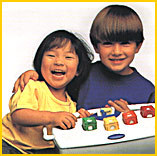 |
| Children love making music and a number of recent studies are revealing that music can enhance your child’s developing mind. Exposure to music training at an early age can have long-term enhancements in your child’s ability to perform spatial-temporal tasks. | |
| Why is this important? Spatial reasoning is what enables your child to perceive the visual world, transform mental images of physical objects, and recognize variations of objects. We use this spatial reasoning in math, geometry, physics, chess, and much more! Music seems to exercise the brain for these higher brain functions, shaping and making it more receptive to learning spatial tasks. |  |
| Music Blocks gives your child the opportunity to explore the world of music by playing with traditional blocks. Your child will discover the underlying structure of music and learn the way rhythms, patterns and melodies are formed. | |
Did You Know?• The College Entrance Examination Board reported in 1996 that students with experience in musical performance scored 51 points higher on the verbal portion of the SAT and 39 points higher on the math section than the national average. (1) |
Click here to learn more about Why Music Matters
Back to Music Blocks • Back to Your Child's Mind
© NEUROSMITH 1999
• phone (562)434-9856 • fax (562)438-7562 •
email: custserv@Neurosmith.com